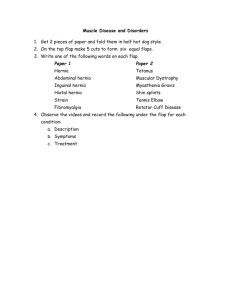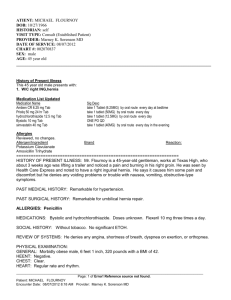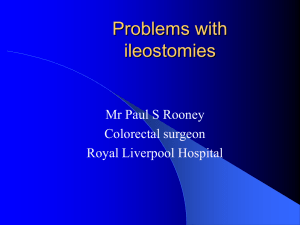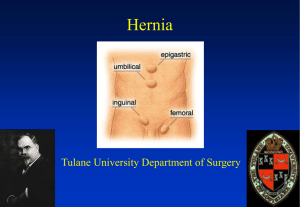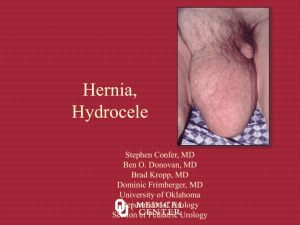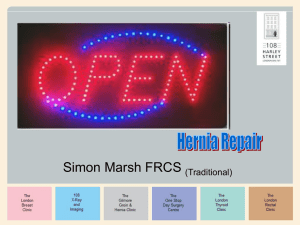metoda Shouldice'a i Desarda
advertisement
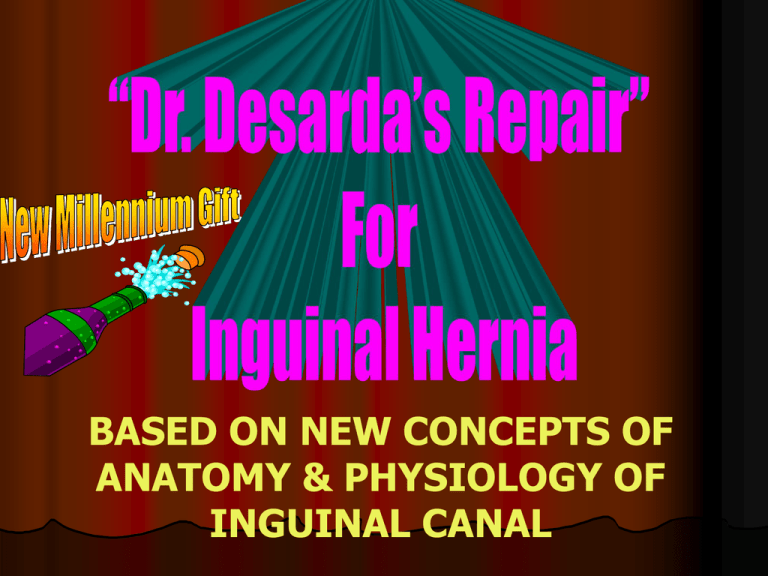
BASED ON NEW CONCEPTS OF ANATOMY & PHYSIOLOGY OF INGUINAL CANAL PROF. Dr. Desarda M. P. M.S.(GEN.SURG.);FICS(USA);FICA(USA) HERNIA SPECIALIST & GENERAL SURGEON 1. IN CHARGE, HERNIA CENTRE, POONA HOSPITAL & RESEARCH CENTRE 2. PROF. & HEAD OF DEPT OF SURGERY POONA HOSPITAL & RESEARCH CENTRE 3. EX-PROFESSOR OF SURGERY AT KAMALA NEHRU GENERAL HOSPITAL 4. EX-ASSO. PROFESSOR OF SURGERY AT BHARATI VIDYAPITH MEDICAL COLLEGE MY OPINION Groin hernia is a commonest disease, so it can not remain a monopoly of a few hernia expert surgeons or specialized hernia centres for better results So, develop a simple operation technique which is recurrence free in the hands of resident surgeons, leaves no foreign body inside and gives early recovery to go back to work without any complications “Recurrence free, no mesh-open inguinal hernia repair with continuous absorbable suture was a dream of every surgeon for a long time” PROBLEMS FACED WITH TODAY’S REPAIRS ARE 1] LOSSES DUE TO RECURRENCES 2] LOSSES DUE TO REEXPLORATION REQUIRED FOR COMPLICATIONS OR PAIN 3] LOSSES DUE TO LONGER TIME REQUIRED TO RESUME ‘NORMAL ROUTINE WORK' “All above mentioned factors result in to loss of 7-8 million Pounds and 295 lost years of productivity in UK including cost of mesh every year” No organized data is available for India. 1% incidence and 1-4% recurrence comes to a loss of 50200 Crores & 5000-20000 lost years of productivity every year What solution? We need an operation technique which is 1. Simple & safe to do & learn by the resident surgeon also with good results 2. Does not use foreign body in any form 3. Does not use weak muscles & fascia 4. Early ambulation without much pain 5. Patient goes home in a day 6. Pt. is back to his work within a week 7. No major complications 8. NO RECURRENCE To achieve this let us understand the CONCEPTS OF ING. CANAL ANATOMY & PHYSIOLOGY Conventional Concepts Strength of the transversalis fascia Obliquity of Inguinal canal Shutter mechanism My Concepts Aponeurotic extensions make post wall strong Musculo aponeurotic structures play role by:- S -Shielding action C -Compression action S -Squeezing action (SCS Action) CONVENTIONAL CONCEPTS Some questions of the physiology or factors that prevent herniation still exist. 1] “Obliquity of the inguinal canal" is not a perfect description since the spermatic cord is lying throughout its course on the trans. fascia. It does not pierce any muscle. 2]Repeated acts of crying & increased intra abd. pressure do not increase the incidence of hernia in new born babies in spite of the almost absent "obliquity of the inguinal. canal" or "shutter mechanism of the canal“. 3]Every individual with a high arch or a patent processus vaginalis does not develop hernia. 4] Those concepts or factors that are said to prevent herniation are not restored in the traditional techniques of inguinal hernia repair and yet 70–98% of pts. are cured. SO,THESE ARE NOT REAL FACTORS Then what are real factors that play a real role in prevention of hernia in normal individuals? OR recurrence after surgery? The role played by the Aponeurotic Extensions from the Transversus Abdominis Aponeurotic Arch in the posterior wall is important & that is not emphasized in the literature at all. ANATOMICAL LAYERS 2] External oblique aponeurosis 3] Ing. Ligament + sp. cord with crem. Muscle + int. oblique & Trans. Abd. muscles. All those three structures are bound together by dense cremasteric fascia like one layer 4] Posterior wall- Apo. Extensions + trans. fascia +(Falx inguinalis if present) 5] Pubic Ramus, Lacunar & Coopers ligament. • Myo-pectineal orifice is weak if Apo. Ext. are absent. Iliopubic tract alone is not of sufficient size to give complete protection In fact Apo. Ext. are inserted on this tract Myo-Pectineal Orifice-No aponeurotic extensions Trnsversus Abdominis Aponeurotic Arch sending Aponeurotic Extensions Scanty Aponeurotic Extensions seen ANATOMY OF ING.CANAL -post.view POSTERIOR WALL The posterior inguinal wall is composed of two layers. 1] The transversalis fascia & 2] aponurotic extensions from the transversus abdominis aponurotic arch The condensed transversalis fascia and aponurotic extensions both give physiomechanical strength to the posterior inguinal wall to resist int. abd. blows. And prevent herniation The strength of the posterior inguinal wall is directly related to the number of Aponeurotic fibers it contains & not to the strength of the tr. Fascia alone. POSTERIOR WALL AT REST POSTERIOR WALL (cont.) Secondly, the posterior inguinal wall is kept physiologically active and dynamic due to those accompanying aponeurotic Extensions & muscle contractions. Muscular contraction of the transversus abdominis pulls this posterior wall and the aponurotic extensions upward and laterally creating tension in it to prevent herniation (Physiologically dynamic action of the post. wall) POSTERIOR WALL IN ACTION POSTERIOR WALL (cont.) This tension in the posterior wall is created in gradation as per the force of contraction of the muscles. And the force of contraction of the muscle changes as per the force of the internal abdominal blow. This is important physiological phenomenon. The posterior inguinal wall should be described as an independent entity, playing an important role in the prevention of hernia formation, not only because of its mechanical strength but also because of its dynamic nature Such a physiologically dynamic & strong posterior wall is needed to be constructed to give 100% cure from the ing. hernias TRANSVERSALIS FASCIA Thus you will find that trans. Fascia hardly plays any role in prevention of herniation except at places where it is strengthened by additional fibrous condensation called as Iliopubic tract. Elsewhere Trans. Fascia is papery thin just as endo-abdominal fascia. Proper cover of Apo. Ext. over the trans. Fascia gives real protection. And you will never find them in your hernia patients while operating. APONUROTIC EXTENSIONS MUSCULO-APONUROTIC STRUCTURES 47 % of individuals having full cover of Apo. Ext. will never develop hernia in their life time If Apo. Extensions are absent or deficient (seen in 53% of individuals), then the trans. fascia alone can not resist the internal blows for a long period and herniation occurs But all 53% individuals with absent or deficient Apo. Ext. do not develop hernia because of the additional role played by the strong musculoapo. structures around the inguinal canal ‘Shielding-Compression-Squeezing’ action of those musculo-apo. structures around the canal prevent herniation in such people with weak post. Wall (Article published in BMC Surg 03) Aetio - Patho - Physiology Int. abd. blows like Coughing, Straining etc. Post Wall resist int. abd. blows Trans. fascia alone can not stand int. blows if Apo. ext. are absent or deficient. BUT STILL Strong muscles around canal give protection Weak muscles + absent Apo. ext. then herniation takes place- because int. ring & post. wall are not protected & post. wall is not strong MUSCULO-APONUROTIC STRUCTURES(cont.) It means if Apo. Ext. are absent or deficient in post wall making it weak & muscles used for repair are also weak then recurrence is sure to take place (Seen in today's open no mesh repairs) “Therefore, any new approach to inguinal hernia repair must consider replacing Apo. element in the post. wall to make it strong and also give additional muscle strength to the weakened muscle arch to keep it physiologically dynamic” SUTURES Interrupted sutures are used to distribute the tension on suture line on all the stitches equally to avoid the disruption of sutures & resulting recurrence Non absorbable sutures are used to give unlimited time for sutured tissues to heal Interrupted sutures with non absorbable suture material has been a thumb rule in any hernia repair for this reason till today Continuous suturing & that too with absorbable suture material was never even imagined by any body till today UPPER LEAF OF EOA IS SUTURED TO INGUINAL LIGAMENT UPPER BORDER OF SEPERATED STRIP IS SUTURED TO THE MUSCLE ARCH Mechanism of Action Strip is fixed below & medially All muscles exert action above & laterally Ext. oblique gives additional strength to the weakened int. oblique & trans. abdominis Contraction of muscle increases tone of the strip converting it into a shield to prevent herniation or recurrence Tone of strip is graded as per force of muscle contractions (physiologically dynamic wall) Strip replaces the absent aponurotic fibres giving a natural support to the trans. fascia Mechanism of action that prevents recurrence Mechanism of action that prevents recurrence Star Points of Technique It is a Herniorrhaphy operation / plasty Locally available live & active tissue EOA is large enough to get strip easily You get physiologically dynamic posterior wall No difficult dissection is required No foreign body or special material required Satisfies all criteria of modern Hernia surgery like day surgery, low learning curve, early ambulation, recovery in a week, minimal pain, no major complications and ZERO RECURRENCE STATUS TODAY Today, this operation is being followed in many countries like Poland, Cuba, Ukraine, Albania, Libya, Iran, Brazil, Afghanistan, Russia, Korea, Slovakia and many other countries Surgeons from those countries have presented their papers on this technique showing same results & no recurrence Web site http://herniasurgery.tripod.com and http://www.geocities.com/desarda have been visited by more than 2 lac of people till today “RECURRENCE FREE INGUINAL HERNIA REPAIR WITH CONTINUOUS ABSORBABLE SUTURES LEAVING NO FOREIGN BODY IN SIDE THE PATIENT IS NO LONGER A DREAM BUT MAY BECOME A REALITY IN FUTURE” EMAILS ARE POURING FROM FOREIGN COUNTRIES From: Jan Guthrie [j.guthrie@thehealthresource.com] Sent: Tuesday, January 04, 2005 7:21 AM To: desarda@lycos.co.uk Subject: physicians in North America utilizing your new procedure Dr. Desarda, Congratulations on your revolutionary breakthrough in inguinal hernia repair. Have you trained any physicians in North America in this procedure? I have a patient who would very much like to have your procedure to correct his inguinal hernia. Thank you, Jan Guthrie Researcher The Health Resource, Inc. www.thehealthresource.com EMAILS ARE POURING FROM FOREIGN COUNTRIES From: Wasilij Wlasow vvlasov@mail.ru Date: Monday, December 05, 2005 9:29 AM To: Prof.Dr.Desarda MP desarda@hotmail.com Subject: Letter for Desarda Dear Dr. M.P.Desarda I was very glad to see you. It was my dream to speak with you, real Desarda. And it came true. Thanks for your words about me. I Hello. My name is Sviatoslav. I was translator for you in Biskupin. will try to learn English better to speak with you in a future. We have many interesting photographs with you from Poland. And I have a little question for you. Would you like to find and send me Email few materials from literature about methods of treatment of femoral hernia in India. Because it necessary for my scientist work and is very difficult for me to find it in our country. We remember our visit to Poland & our acquaintance. We just successfully had used your method of hernioplasty in 9 cases of operation on 8 patients. We invite you to take part in the III-d Ukrainian Scientist-Practical Conference “Modern methods of surgical treatment of abdominal hernia”, which will take place on 14-15 April 2006 in Kyiv city. And send you announcement about conference. Ministry of Public of Ukraine Ukrainian Association of Hernia Surgeons National Medical University by name O.O.Bogomolets Centre of surgery of abdominal hernia Yours truly V.Vlasov OPERATIVE WORKSHOP AT RAMOWY PROGRAM KONFERENCJI Czwartek 16 listopada 2006 12:00 - 17:00 Workshop: operacje przepuklin pachwinowych (przekaz z sali operacyjnej do hotelu Gromada): 1. Metoda Desardy (bez wszczepu syntetycznego) - S. Dąbrowiecki 2. Metoda Yalentiego PAD - G. Yalenti (Włochy); A. Opertowski 3. Laparoskopowa naprawa 1POM - S. Czudek (Czechy) 4. Metoda Lichtensteina (częściowo wchłanialna siatka Ultrapro) - A. Matyja 5. Absorbable Pług Gore (wchłanialny korek) - M. Śmietański 6. Prolene Hernia System (siatka przestrzenna prolenowa) P. Ryli 7. Ultrapro Hernia System - (częściowo wchłanialna siatka przestrzenna) - J. Stanisławek Speakers from different countries „Czy operacja Desardy jest alternatywą dla metod z siatką syntetyczną?" prowadzący: S.Dąbrowiecki, J.Szopiński, V. Ylasow V.V. Vląsov ,, Our experience of herniorrhaphy by M. Desarda in inguinal hernia repair". K. Kometą „ Pierwsze doświadczenia w naprawie J. Orzechowski „ Wczesne wyniki operacyjnego leczenia przepukliny pachwinowej metodą Desardy J. Szopiński „ Zaproszenie do wieloośrodkowego badania klinicznego (RCTj nad porównaniem wyników leczenia przepuklin pachwinowych metodami: Desardy i Lichtensteina z zastosowaniem zaawansowanego oprogramowania internetowego ". przepuklin pachwinowych metodą Desardy ". Desarda vs Shouldice study Zespół Opieki Zdrowotnej w Jędrzejowieul. Małogoska 25 28 – 300 JędrzejówTel. 041 386 14 (Sekretariat) adresy e-mail:zozjedrzejow@pro.onet.pl - ZOZ 2. Oddział Chirurgii Ogólnej z Pododdziałem Ortopedycznym Ordynator – Lek. med. Władysław Sędek Oddział liczy - 47 łóżek. Dzięki nowoczesnej bazie diagnostycznej i wyszkolonej kadrze medycznej wachlarz procedur chirurgicznych wykonywanych w Oddziale jest bardzo szeroki. Wykonuje się praktycznie wszystkie operacje w obrębie jamy brzusznej (z wyjątkiem zabiegów naczyniowych), łącznie z wielonarządowymi, resekcjami z powodów onkologicznych (np. operacja Whipple'a). Od 5 lat Oddział posiada zestaw do zabiegów laparoskopowych, który stosuje się do małoinwazyjnych operacji usunięcia pęcherzyka żółciowego z powodu kamicy lub do laparoskopowych operacji z powodu żylaków powrózka nasiennego. Przepukliny operuje się najnowocześniejszymi metodami beznapięciowymi (metoda Shouldice'a i Desarda), również z wykorzystaniem siatek polipropylenowych (metoda Lichtensteina). Zastosowanie tych metod znacząco obniża odsetek nawrotów i podnosi komfort pacjenta w okresie pooperacyjnym. W Oddziale wykonuje się również operacje ORIGINAL ARTICLE PUBLISHED Videosurgery and Other Mini invasive Techniques 2006; 1: 18-22 Artykuł oryginalny:Wczesne wyniki leczenia przepuklin pachwinowych sposobem Desardy u 17 operowanych chorych. A preferable method of inguinal hernia repair nowadays is the use of mesh graft in tension-free techniques. In the past few years a new technique developed by a surgeon from India, Mohan P. Desarda, was introduced. This method is based on the use of a strip of the external oblique aponeurosis which strengthens the posterior wall of the inguinal canal. Aim: To evaluate the initial results of Desarda’s inguinal hernia repair six months after the surgery. Material and methods: A group of 17 patients was analyzed. 15 male and 2 female patients ORIGINAL ARTICLE imie i nazwisko osoby prezentujacej: Waldemar Kwiecieństopien naukowy: lekarz medycyny miejsce pracy:ddział Chirurgiczny Szpitala ZOZ w Jędrzejowie (woj. świętokrzyskie) e-mail: w-kwiecien@o2.pl autorzy zglaszanej publikacji: Waldemar Kwiecień Leszek Kania, Jerzy Prawda tytul zglaszanej publikacji: Wyniki leczenia przepuklin sposobem operowanych Desardy u 47 streszczenie publikacji: Celem pracy była ocena wyników leczenia przepuklin pachwinowych sposobem Desardy w Oddziale Chirurgicznym w Jędrzejowie od początku jej wdrożenia w czerwcu 2002 roku do końca roku 2004. Informacja o wieloośrodkowym badaniu klinicznym Desarda vs Lichtenstein imie i nazwisko osoby prezentujacej: Waldemar Kwiecień stopien naukowy: lekarz medycyny miejsce pracy: Oddział Chirurgiczny Szpitala ZOZ w Jędrzejowie (woj. świętokrzyskie) e-mail: w-kwiecien@o2.pl Published in 2005 ORIGINAL ARTICLE Operacja Desardy jak możliwa metoda z wyboru w leczeniu przepuklinpachwiny. imie i nazwisko osoby prezentujacej: Orest Lerchuk stopien naukowy: lek.med. miejsce pracy: Szpital Wojewódzki we Lwowie. Klinika Chirurgii Ogólnej i Endokrynologicznej we Lwowie. e-mail: Lorest@mail.lviv.ua autorzy zglaszanej publikacji: Pawlowskyj Mychajlo, Lerchuc Orest, Markewich Yuri, Zaleskyj Igor Study of 43 patients Porównanie kosztów wykonania operacji przepukliny pachwiny metoda Desarda i Lichtensteina Piotr Cisowski stopien naukowy: Dr n. med. miejsce pracy: SU Bydgoszcz ulica: C. Skłodowskiej 9 miejscowosc: Bydgoszcz e-mail: p.cisowski@vp.pl Porównano koszty wykonania zabiegu jednostronnej przepukliny pachwinowej metodą Dessarda i Lichtensteina na podstawie dostępnych w szpitalu zasad rozdziału kosztów opartych o system ICD 9 oraz na podstawie kosztów rzeczywistych. Dokonano również analizy zmian stawek płaconych przez monopolistycznego płatnika od roku 1999 w województwie kujawsko-pomorskim za operacje przepuklin. PRESENTATION IN CUBA Organizan Sociedad Cubana de CirugíaPalacio de Convenciones 10.40-10.50 AM VIERNES 10 DE NOVIEMBRE DEL 2006 TÉCNICA MOHAN DESARDA. UN NUEVO ENFOQUE EN LA REPARACIÓN DE LA HERNIA INGUINAL. DRS. PEDRO R. LÓPEZ RODRÍGUEZ, FELIPE R. LÓPEZ DELGADO, DR. HOSPITAL GENERAL DOCENTE “ENRIQUE CABRERA”. CUBA PRESENTATION VIII Spotkanie Polskiego Klubu Przepuklinowego 9-11 listopada 2007 Krakowie Operacja sposobem Desardy Przygotowaliśmy pokazową operację przepukliny metodą Desardy. Film nagrany w Klinice Chirurgii Ogólnej i Endokrynologicznej AM w Bydgoszczy trwa około 20 min, jest zaopatrzony w komentarz i szczegółowe wyjaśnienie metody. Dostępny w postaci płyty CD. Opłatę w wysokości 30 zł - należy wpłacić na konto: z dopiskiem "płyta Desardy" Zamówienie i informację o wpłacie proszę przesłać na adres e-mail:j_szopinski@hernia.pl Operacja przepukliny pokazowa M.P. Desarda 15 październik 2005 09.00 Transmisja z sali operacyjnej M. P. Desarda 10.00 New concepts of inguinal hernia and its repair in perspective with to days trend M. P. Desarda 11.00 Wyniki leczenia przepuklin sposobem Desardy u 47 operowanych W. Kwiecień 11.10 Doświadczenia własne w leczeniu przepuklin pachwiny met. Desardy. Kapala 11.20 Operacja Desardy jako możliwa metoda wyboru w leczeniu przepuklin pachwiny. O. Lerchuk THANK YOU
